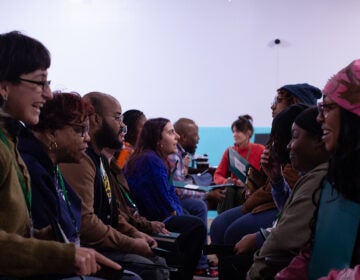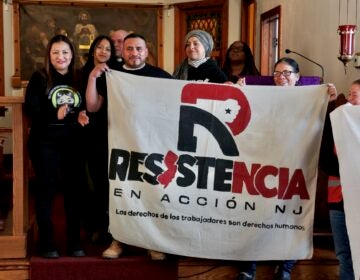How teamwork helps you be more fully yourself

(Teamwork image courtesy of Shutterstock.com)
We all know how good it can feel to have a colleague we can connect with, someone we can relate to, both within the scope of the work and just being ourselves. And we know how lousy it is to see the opposite: the face of someone we have to be on guard with or whom we can’t trust to do his or her part so that we can do ours.
A big part of feeling comfortable and fully yourself in the workplace relates to the people you work with — whether you’re all on-site or working remotely. It may be especially visible in medical professionals, but whether it’s subtle or obvious, I’ll bet most of us feel the impact of the group we work with.
But … is it a group? Or a team? And does that make a difference?
I checked in with management consultant K. Palmer Hartl. His recent book “The Ten Commandments of Management” looks at the subtle relationships that underlie workplace dynamics. So I asked him: How can you strike a balance with your coworkers to create space where you can be yourself and also grow?
Managing intra-team relationships
Hartl says it comes down to relationships. He says it’s important for teams to regularly evaluate themselves. I’m used to doing my workplace processing on my own, but what does it look like when it’s done collectively?
“One of the things that can be helpful to an individual and to the team is to get good regular feedback about how you’re being perceived in the team,” Hartl says. “How effective you are, how you can keep doing what is perceived as effective, and what you can do to address what seems less effective. The process work that involves feedback from team members is a growth opportunity.”
In other words, a safe space can also be one that invites growth. Hartl offers an example: “I’m thinking of a team I mention in the book. When I came into the situation, it was clear the team wasn’t functioning optimally, so we devised an exercise where, for each team member, the others created feedback of ‘start, stop, and continue.’ What would we like to see you start, stop, and continue in what you’re presently doing?
“Each person had received a 3×5 card with those pieces of info on it. They then shared that info with the rest of us — what had they heard from their colleagues about what people wanted. It was an amazingly useful exercise. The team gelled after that in a way they hadn’t for years because they’d never done process work, so never given each other feedback.”
Healthy interdependency
I liked the idea, but I immediately flashed on various group experiences I’d had. When people were self-aware, it could be a great experience. But when they were not, it could be disastrous.
Hartl agreed: “It’s not to say it’s an easy thing to do, because it isn’t. It’s difficult to give negative feedback to colleagues you’re going to be working with the next day. But in terms of the people being able to grow, it’s enlightening.”
This brought me back around to my original question: What’s the difference between a group and a team? Here, Hartl hit on an insightful distinction that I hadn’t thought about before. It went further than relationship, to healthy interdependency.
“Teams aren’t just a collection of people — that’s just a working group,” he said. “If you’re part of a real team, you need the others to do something in order for you to do something — one of the ways to improve people’s effectiveness is to make sure those interdependencies are clear.
“Team is a word overused and not very well understood,” he says. “If there’s no necessary interdependency — if I have no real need to work with you — we don’t have a team. Interdependency means I need you to do your part well in order for me to do my part well.”
And because we were talking the day after the Green Bay Packers ended up losing against the Seattle Seahawks, the metaphor was apt. Hartl had been watching the pre-game coverage, when Terry Bradshaw was asking quarterback Aaron Rodgers about going into the game with a calf-muscle injury he’d sustained earlier.
Rodgers took a pad of paper and wrote “TEAM” it.
Hartl laughed. “Essentially he was saying, ‘I have a need for the others on the team to make it happen.'”
It’s my guess that would make exactly the kind of space that allows someone to be oneself and to grow (the final score notwithstanding).
WHYY is your source for fact-based, in-depth journalism and information. As a nonprofit organization, we rely on financial support from readers like you. Please give today.




